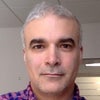Ken Burns on the Process That Geniuses Like Steve Jobs Use to Achieve Success The filmmaker and this year's Ken Burns American Heritage Prize recipient, Dr. N. Scott Momaday, discuss applying genius and passion to goals that matter.
By Dan Bova

Last week, the American Prairie Reserve honored Kiowa novelist and poet N. Scott Momaday, Ph.D., with the 2019 Ken Burns American Heritage Prize, which recognizes "individuals whose achievements have advanced our collective understanding of America's heritage and the indomitable American spirit." Past winners include artist Maya Lin and writer David McCullough. Entrepreneur attended this year's presentation and, afterward, spoke with Ken Burns and Dr. Momoday about the entrepreneurial spirit in America.
This award has been given to geniuses in a diversity of disciplines. What common trait do you see in people who aspire to and achieve greatness?
Ken Burns: I feel like people comment all the time that there's this huge body of work that I've done that's incredibly diverse, and I always say that I make the same film over and over again, and each one asks this deceptively simple question: Who are we? Who are those strange and complicated people who like to call themselves Americans? I think what unites the three choices that we've made so far is essentially that pursuit, asking some distinct and honorable question about who we are. And letting the subjects bring an echo of what that might be back. So it could be in the grass earthworks of Maya Lin or in the poetry of N. Scott Momaday or in the biographies of David McCullough. They all are united by some sort of animating question and search.
Related: Ken Burns Talks About Leadership, Productivity and Achieving Immortality Through Storytelling
Any advice for entrepreneurs who say, "I want to be the next Jeff Bezos" or "I want to be the next Steve Jobs"?
Ken Burns: The sort of misfortunes of our present moment, with all its cacophony of noise and information, is that we think that we can skip the different steps. This is all about process. It's all about process, and it's about discipline. And too often we are given the false information, the "fake news" that steps can be skipped. They cannot. I exiled myself to rural New Hampshire 40 years ago this summer. Within about three days, I realized it wasn't an exile -- it was a salvation. Be able to focus and concentrate my work and my energies into continuing to tell stories in American history is the best decision I ever made. People need to understand that something will be given up. Friction is required. Obstacles have to be overcome. We paint a kind of false picture that all I need to do is wear a mock turtleneck sweater and I'm Steve Jobs. He was a friend of mine. You need to study a bit deeper about what he went through and what he suffered, the extraordinary discipline, the great cost that all of this takes. You need to weigh that.
Related: Business Genius Can Be Taught, Study Says
What is the most important thing for entrepreneurs hoping to find success?
N. Scott Momaday: Well, I hate to speak in cliches, but I think the most important thing is to do what you like doing. If you have a passion for something, pursue that passion and stay with it, develop it. Whether you're a writer or a filmmaker or a truck driver. The best thing you can do is invest yourself deeply in it, and you will succeed. I think it needs to be closer to you.
How do you define success?
N. Scott Momaday: It is about your goal. Aspiring to be a millionaire is not as worthy as striving to be the best that you can be in your field. I would rather write a poem that met my specifications than to have thousands of dollars.
Related: Discover and Work in Your Entrepreneurial Zone of Genius
You've won the Pulitzer Prize, among many other awards. Ever have doubts about whether you were pursuing the right thing?
N. Scott Momaday: Yes, I have had such doubts. Finding that thing is trial and error. I wanted at one time to be a lawyer, and I indeed went to law school for a year. I found out that it wasn't about Perry Mason. It was about torts and I lost interest in it. [Laughs] So I turned to writing following my mother's footsteps. That's how I came to be a poet.
How do you keep yourself focused when things aren't going the way you hoped?
N. Scott Momaday: I have a mantra that I wrote myself, and it goes like this: Be still. Gather yourself. The storm rolls away and there comes a clear dawn. I like to think about that, it gives me peace.












